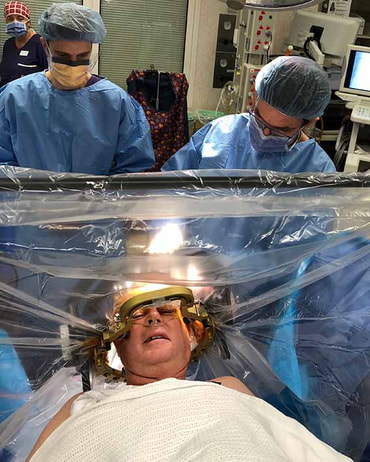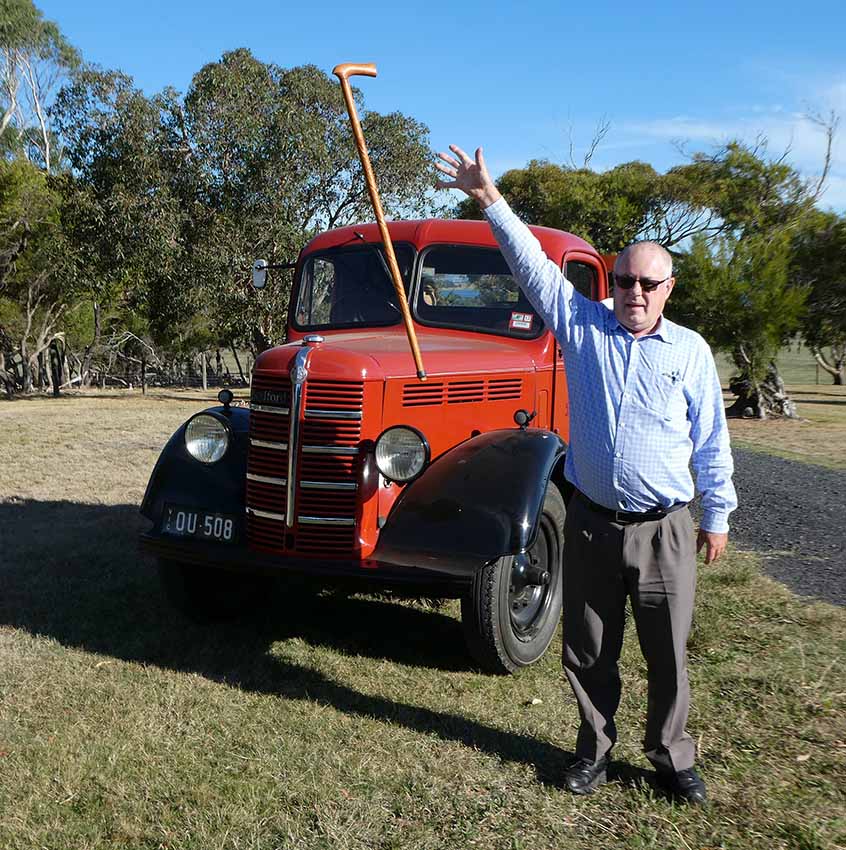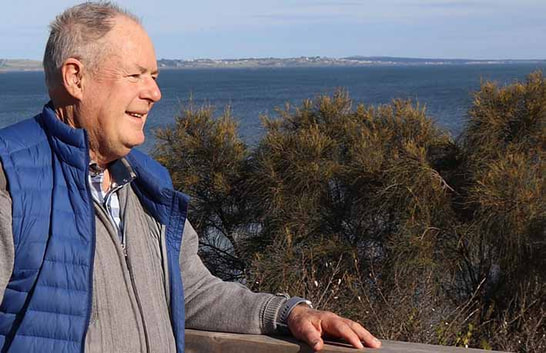 Cabrini Hospital, March 21, 2018: David was awake during
Cabrini Hospital, March 21, 2018: David was awake during the operation as his responses were used to guide the
placement of the electrodes.
By Geoff Ellis
A WINTER’S day in Corinella. David Kemp steadies himself against the guard rail to point out the landmarks. The couple don’t understand the sign: “You are here.” Sure, but that arrow makes no sense. David is trying to find a common reference point. He indicates the San Remo bridge so the rest of Western Port falls into place. The couple move on. David resumes his own journey as he cautiously turns toward the cafe and studies the pathway back to the car.
Post readers shared the start of David Kemp’s journey two years ago, when David discussed his initial Parkinson’s disease diagnosis and preparations for the deep brain stimulation (DBS) operation that could stop the hand trembling, awkward gait and stilted speech. These symptoms were worsening but there were serious risks in the operation, including possible brain damage and death.
A WINTER’S day in Corinella. David Kemp steadies himself against the guard rail to point out the landmarks. The couple don’t understand the sign: “You are here.” Sure, but that arrow makes no sense. David is trying to find a common reference point. He indicates the San Remo bridge so the rest of Western Port falls into place. The couple move on. David resumes his own journey as he cautiously turns toward the cafe and studies the pathway back to the car.
Post readers shared the start of David Kemp’s journey two years ago, when David discussed his initial Parkinson’s disease diagnosis and preparations for the deep brain stimulation (DBS) operation that could stop the hand trembling, awkward gait and stilted speech. These symptoms were worsening but there were serious risks in the operation, including possible brain damage and death.
On the Sunday before the operation, David was asked to say a few words in the Syndal Baptist Church. Then Bill Brown, the senior pastor, presented him with a beautiful prayer quilt that had been made by a group of church members who said a prayer as each knot was tied, so each one represents a blessing.
David’s big day came on Wednesday, March 21, 2018. The brain surgery was performed under local anaesthetic. David was fitted with a special head frame to keep his head still during the procedure. The operation itself didn’t hurt but the noise of the hand drill cutting into his skull was louder than he had anticipated. Magnetic resonance images (MRI) and assessment of brain signals and David’s responses were used to guide the placement of the electrodes. “Fortunately, they found my brain!” David jokes.
But the surgeons needed two attempts to get each electrode in the correct positions. David was awake during the whole procedure and aware that only three attempts were allowed to find right spot. “Three strikes and you’re out,” he says. Then, he was given a general anaesthetic and the pacemaker and cables were fitted while he was unconscious.
Six days later David sent a message – “Hi Friends; The DBS operation went well, taking two attempts to get both electrodes in the correct positions. Woke up with a massive headache but that was to be expected. The DBS Pacemaker unit was turned on and significant improvement in walking ability followed.”
There were the expected ups and downs and ongoing “tweaking” was necessary over the following weeks, including a six-week period when David was not allowed to drive or to make big decisions. The electronic signal from the pacemaker was adjusted every 7 to 10 days for the first 10 weeks, which was more visits than he had expected, but not cause for concern.
The neurologist needed to find a setting that optimised the desirables outcomes and minimised the side effects. The optimum setting was found on week 10, and the next visit was a review two months later.
All seemed well and subsequent reviews are now every six months with some re-tweaking as needed. A major re-setting was done in November 2019.
At the prompting of some physiotherapists at Cabrini Hospital, David undertook a 10-week Parkinson’s therapy program at Donvale. The weekly two-hour sessions comprised an hour of physical exercise and an hour of presentations by physiotherapists, occupational therapists, a speech pathologist and a dietitian.
Before and after the operation, he received a flood of cards and emails of support from his many activity groups. During the six weeks he wasn’t allowed to drive, he had many well-wishers drop in at home to take him out for coffee or a trip to Corinella. One bus proprietor even took him out on a well preserved historic bus. David is a Gunzle* so this was a special thrill.
But the surgeons needed two attempts to get each electrode in the correct positions. David was awake during the whole procedure and aware that only three attempts were allowed to find right spot. “Three strikes and you’re out,” he says. Then, he was given a general anaesthetic and the pacemaker and cables were fitted while he was unconscious.
Six days later David sent a message – “Hi Friends; The DBS operation went well, taking two attempts to get both electrodes in the correct positions. Woke up with a massive headache but that was to be expected. The DBS Pacemaker unit was turned on and significant improvement in walking ability followed.”
There were the expected ups and downs and ongoing “tweaking” was necessary over the following weeks, including a six-week period when David was not allowed to drive or to make big decisions. The electronic signal from the pacemaker was adjusted every 7 to 10 days for the first 10 weeks, which was more visits than he had expected, but not cause for concern.
The neurologist needed to find a setting that optimised the desirables outcomes and minimised the side effects. The optimum setting was found on week 10, and the next visit was a review two months later.
All seemed well and subsequent reviews are now every six months with some re-tweaking as needed. A major re-setting was done in November 2019.
At the prompting of some physiotherapists at Cabrini Hospital, David undertook a 10-week Parkinson’s therapy program at Donvale. The weekly two-hour sessions comprised an hour of physical exercise and an hour of presentations by physiotherapists, occupational therapists, a speech pathologist and a dietitian.
Before and after the operation, he received a flood of cards and emails of support from his many activity groups. During the six weeks he wasn’t allowed to drive, he had many well-wishers drop in at home to take him out for coffee or a trip to Corinella. One bus proprietor even took him out on a well preserved historic bus. David is a Gunzle* so this was a special thrill.

Whilst many symptoms of Parkinson’s disease remain, the primary mobility ones which the DBS addressed have certainly improved. He has thrown away his walking stick. He can walk unaided though he’s slower and more cautious. He has to plot his course before he moves away from the guard rail and heads for the car. Tables and chairs are obstacles that need to be navigated, every step mapped out. Having to think about every single step causes fatigue and reduces his endurance.
Still, the improvements are obvious. Whilst many symptoms and the need for medications remain, as expected, the tremor has virtually disappeared, and his arms are swinging when he walks. David says he is basically just another person living with a chronic condition and a daily routine of light exercise is essential to a long life.
The continuing side effect of speech difficulty is manageable, it’s part of the trade off. DBS directly changes brain activity in a controlled manner and the neurostimulator can be adjusted to improve either walking or talking but not both. Gains come at the cost of a detrimental impact on the other. He can walk perfectly and mumble or speak perfectly and stumble. The optimum setting is somewhere in between.
David likes to share his experiences. The Corinella Residents and Ratepayer group meets regularly to discuss community concern and aspiration. They often have guest speakers and David was the first person to present on medical rather than municipal matters. The members of the group were on the edge of their seats as he took them on his journey.
“How am I doing? To be honest, apart from regular walks, I am not exercising as much as I should. No doubt it is beneficial, but it is hard to remain motivated, not being a natural athlete. But like everything in life one needs to stick with beneficial tasks to achieve the best results.”
As David treads carefully through the car park he stops to talk about his good fortune. The sun lights his face as he smiles. “People have been so kind. It is remarkable being able to walk properly again instead of shuffling, and without the tremor. I am richly blessed.” His journey continues.
*Gunzle: a person who is passionate about buses, trains and trams.
